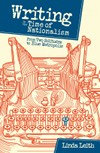
Writing In The Time Of Nationalism: From Two Solitudes To Blue Metropolis
Linda Leith
Signature Edition
$18.95
paper
204pp
9781897109489
Leith’s career – in fact, her very existence as an Anglo-Quebec author and impresario – is a contradiction of the notion that English and French live in total isolation from one another, yet Leith chooses to reify the myth by making her memoir “a story about the effect of two rival nationalisms.” Nationalism has long been the favourite whipping boy of Canadian academics and literati, so it is not terribly surprising that it plays the straw-man villain in Leith’s narrative. Nonetheless, Leith’s insistence on the binary argument stretches credibility. For example, having transformed the solitudes into “two nationalisms” and then into two cities, Montreal and Toronto, Leith then tries, against ample evidence to the contrary, to reconstruct Margaret Atwood as an icon of Toronto-centrism and, by implication, the Anglo solitude.
Leith’s broad brush strokes along the fault line of two solitudes repeatedly obliterate what might be surprising, different and compelling – not to mention more accurate. She tells the reader, for example, that “Margaret Atwood is a Canadian writer; Michel Tremblay is a Quebec writer,” followed by near-tautological though dated observations that English Canadian literature tends to be taught in university English departments, Quebec literature in French departments. What gets overwritten by these ostensibly obvious declarations is “the news” that Tremblay has recently been vilified by Québécois nationalists (Bernard Landry announced he would never again attend a Tremblay play), that Canadian literature is being taught and researched worldwide in French and English in a comparative context, and that virtually every university in Quebec offers courses on Anglo-Québécois literature these days.
Leith’s claims that the 1940s and 1950s were a “golden age” for English-language writers in Montreal, that the rise of English-Canadian nationalism caused a decline in the fortunes of Montreal’s English-language writers, that Quebec nationalism caused a further decline, and that we are currently enjoying a “revival” of the “golden age” of the 1940s and 1950s are all debatable in varying degrees. To their credit, many Anglo writers were struggling to pursue their craft during la grande noirceur in Duplessis’s Quebec. Ralph Gustafson was in New York, Richler was in Europe, Mavis Gallant had moved to Paris and was publishing in The New Yorker. As Gustafson succinctly describes the period in “Québec, Writing in English” (The Oxford Companion to Canadian Literature): “English Queìbec was abroad.” What the real drama of Leith’s narrative, her confrontation with that other “solitude,” Franco-Québécois nationalism, reveals, aside from perceived slights, bureaucratic red tape, scheduling headaches, and a series of misunderstandings with Denise Boucher, author of Les fées ont soif and then president of UNEQ (Union des écrivaines et des écrivains queìbeìcois), is Leith’s consistent essentializing of the Québécois – as if “Québécois” meant being the bearer of some immortal, homogenous, immutable essence. Her consequent vision of Anglo Quebec is explicitly not Québécois; it is a vision of a circumscribed Anglo Montreal.
Leith’s memoir follows the structure of a novel, with a buildup of conflict and tension, various reversals leading to a happy ending (the Blue Metropolis Festival), a denouement (Leith announcing her retirement), and a post-climactic, asyndetic epilogue of recent Anglo-Québécois literary successes. Ultimately, the two solitudes offer a mythic background foil to the David-against-two-Goliaths story that Leith wants to tell – and Leith deserves this emblem. For once again, when no-one else dared, she has launched the discussion of Anglo-Quebec literature and a debate that will take us long into the future. mRb






0 Comments